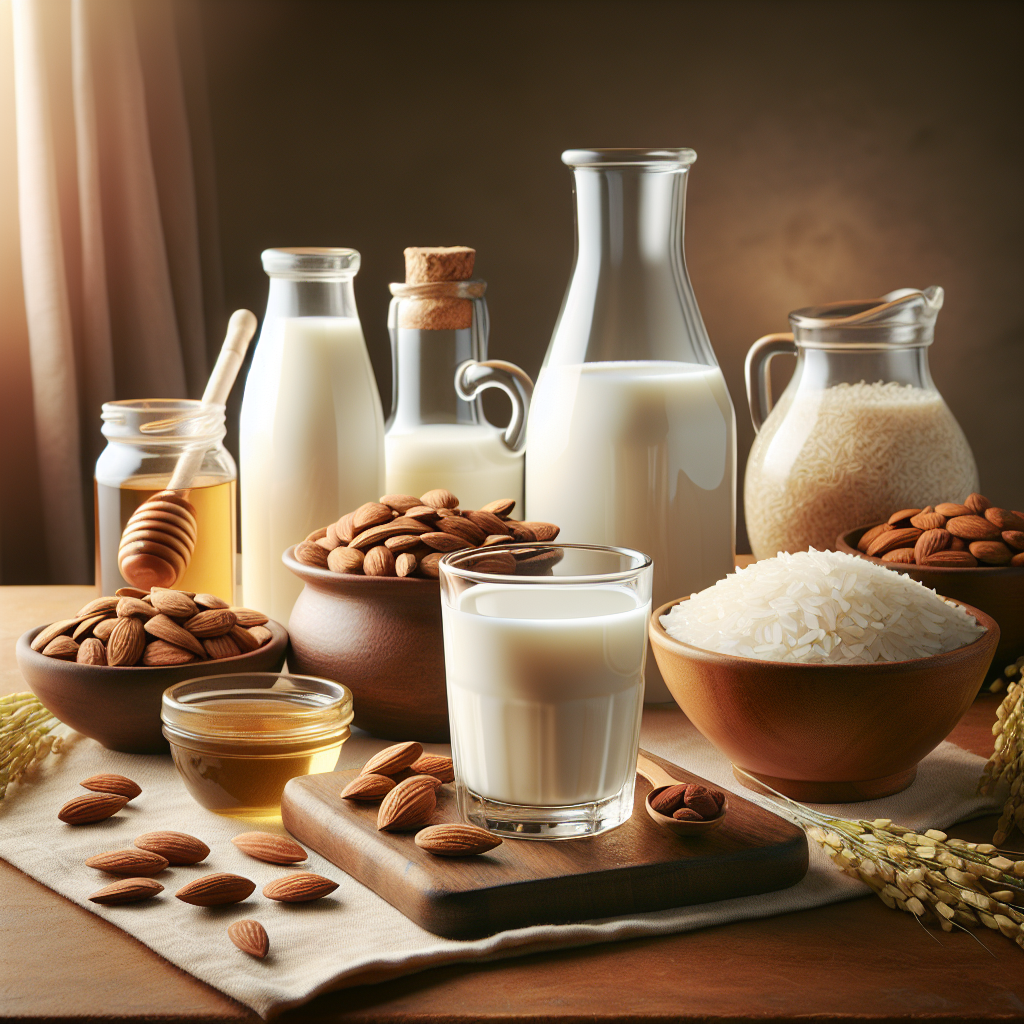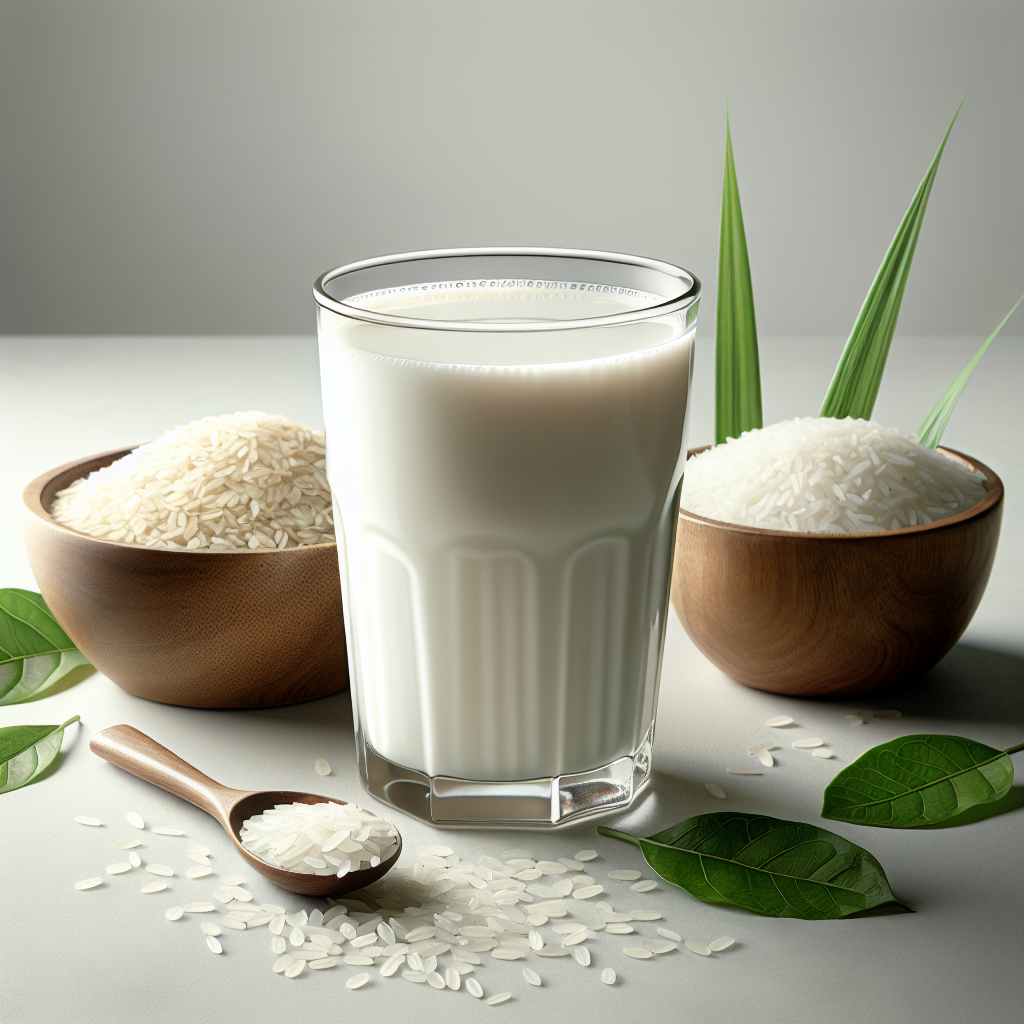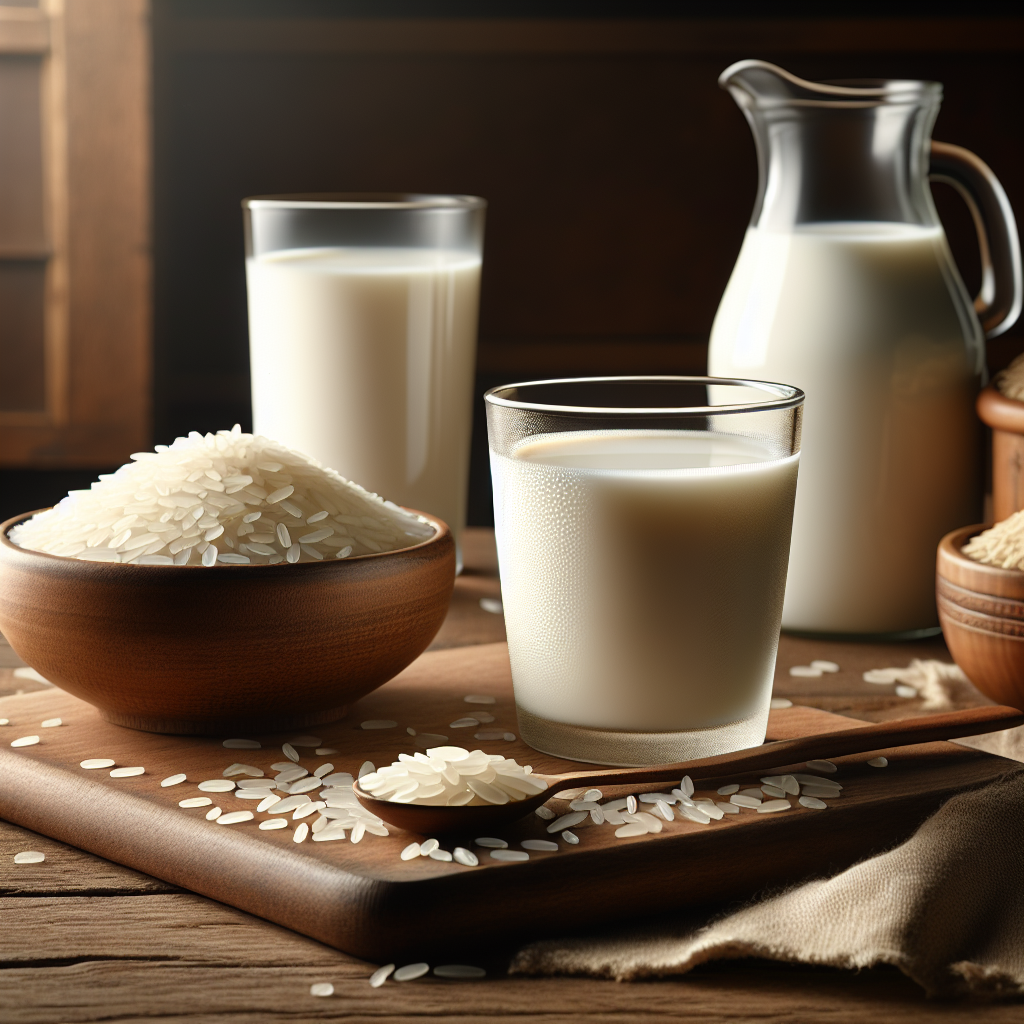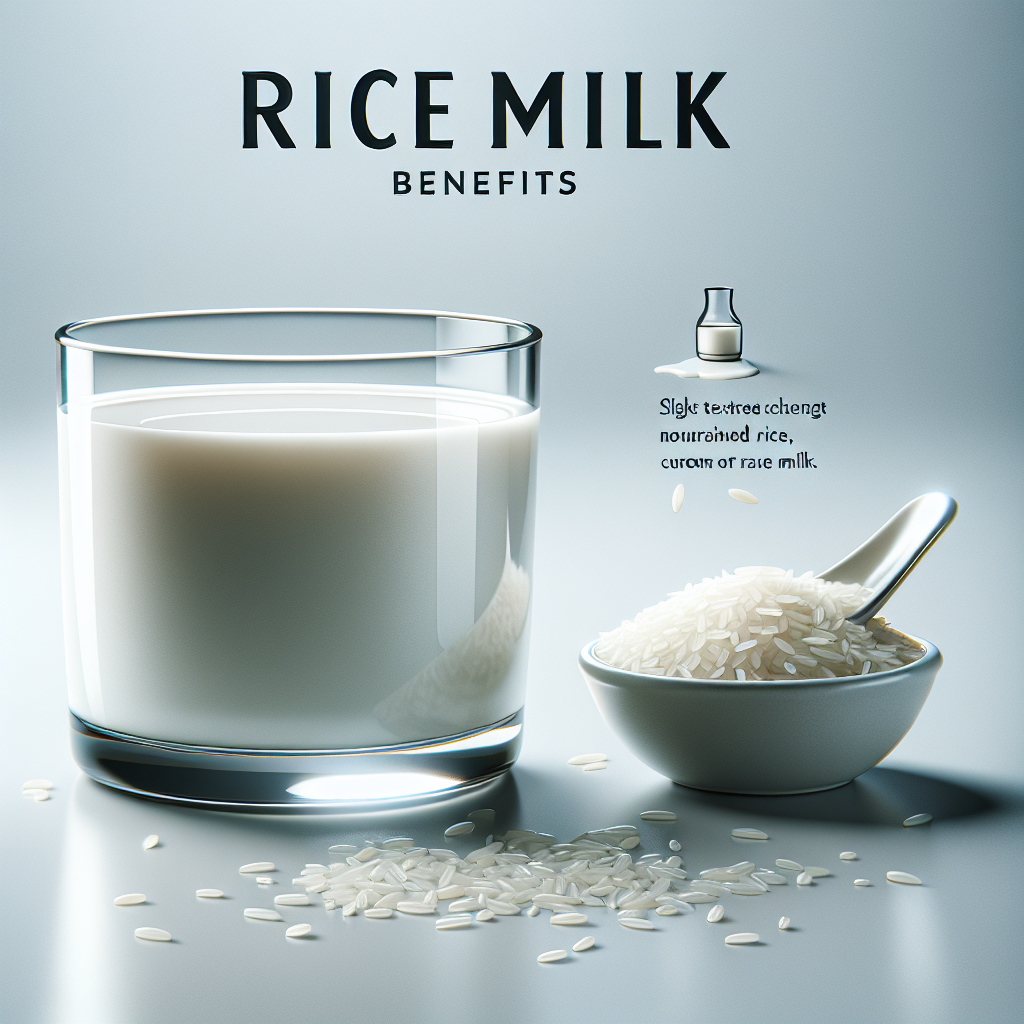In recent years, rice milk has gained popularity as an excellent alternative to traditional dairy milk. This plant-based milk is derived from whole rice grains, typically brown rice, and offers a range of benefits that make it a preferred choice for many. One of the key advantages is that rice milk is naturally lactose-free, making it suitable for individuals who are lactose intolerant or have dairy allergies.
Another significant benefit is its neutral flavor. Unlike other plant-based milks that may have a strong or distinct taste, rice milk has a subtle flavor that blends well with various dishes and beverages. This makes it an ideal option for those who may be new to plant-based milk and are looking for an easy transition.
Related: The Comprehensive Guide to Rice Milk Benefits
Rice milk is also an excellent choice for individuals who are health-conscious. It typically contains no cholesterol and is low in saturated fats, which can help in maintaining heart health. Additionally, it is free from common allergens like soy and nuts, making it a safe option for people with multiple food sensitivities.
If you are looking for an eco-friendly option, rice milk ticks that box too. Its production has a lower environmental impact compared to dairy milk, contributing to a more sustainable lifestyle. With MilkDepot.ca's unique blender, you can make fresh, filtered rice milk at home in less than 60 seconds, saving up to 90% of the cost of store-bought milk.
Get yours today! Experience the myriad of benefits that rice milk offers and make the switch for a healthier, more sustainable lifestyle.
Health Benefits of Rice Milk

Rice milk is not only a delicious and versatile dairy alternative but also comes packed with numerous health benefits that make it a standout choice. One of the most significant advantages is its digestive ease. Unlike dairy milk, which can be heavy and difficult for some to digest, rice milk is light and gentle on the stomach, making it suitable for people with gastrointestinal issues.
Rich in essential nutrients, rice milk provides a good source of vitamins A, D, and B12, which are crucial for maintaining overall health. Vitamin A is essential for healthy vision and immune function, vitamin D supports bone health, and B12 is vital for nerve function and the production of red blood cells.
For those looking to manage their weight, rice milk can be a beneficial addition to their diet. It is typically lower in calories compared to whole dairy milk and contains no saturated fats, which can contribute to a healthier weight management regimen. Additionally, rice milk is cholesterol-free, making it a heart-healthy option that can help in reducing the risk of cardiovascular diseases.
Another noteworthy benefit is its antioxidant properties. Rice milk contains trace amounts of selenium and manganese, which are known antioxidants that help protect the body from oxidative stress and free radical damage. This contributes to better overall health and may even play a role in reducing the risk of chronic diseases.
For individuals with dietary restrictions, rice milk is a lifesaver. Being naturally free from lactose, soy, and nuts, it is a safe and healthy milk alternative for people with allergies or intolerances. Its hypoallergenic nature ensures that more people can enjoy its benefits without adverse reactions.
How to Make Rice Milk at Home
Making rice milk at home is a simple, cost-effective process that allows you to control the ingredients and tailor the flavor to your liking. With MilkDepot.ca's revolutionary blender, you can create fresh, filtered rice milk in less than 60 seconds, but here’s a general method to get you started:
Ingredients:
- 1 cup of cooked rice (white or brown)
- 4 cups of water
- Optional: a pinch of salt, 1-2 tablespoons of sweetener (such as honey, maple syrup, or dates), and 1 teaspoon of vanilla extract
Instructions:
- Step 1: Start by cooking the rice according to the package instructions. Let the rice cool down to room temperature once it's fully cooked.
- Step 2: Add the cooled rice and water to your blender. If you're using optional ingredients like sweeteners or vanilla extract, add them now.
- Step 3: Blend on high speed for about 1-2 minutes, or until the mixture is smooth and creamy. With MilkDepot.ca's powerful motor, this step takes less than 60 seconds!
- Step 4: Strain the mixture through a fine-mesh sieve or cheesecloth into a large bowl or pitcher. This will remove any remaining rice solids, giving you a smooth and creamy rice milk.
- Step 5: Transfer the strained rice milk into a clean glass bottle or jar and store it in the refrigerator. It can be kept fresh for up to 4-5 days. Remember to shake well before each use, as natural separation may occur.
Making your own rice milk at home not only ensures that you know exactly what goes into your drink but also allows you to experiment with flavors. Whether you prefer it plain, sweetened, or with a hint of vanilla, homemade rice milk is a delicious and nutritious alternative to store-bought varieties.
Nutritional Value of Rice Milk

Rice milk is a popular dairy alternative that offers a range of nutritional benefits. Made from rice and water, this plant-based milk is naturally free from lactose, cholesterol, and saturated fats, making it an excellent choice for those with dietary restrictions or preferences. Let's delve into the nutritional profile of rice milk:
Calories and Carbohydrates:
Rice milk is relatively low in calories compared to cow's milk, with one cup typically containing around 120 calories. It is also a good source of carbohydrates, providing about 22 grams per cup. These carbohydrates are primarily in the form of natural sugars, making rice milk a quick source of energy.
Vitamins and Minerals:
Commercially-produced rice milk is often fortified with essential vitamins and minerals to enhance its nutritional value. Common fortifications include:
- Calcium: Essential for maintaining strong bones and teeth.
- Vitamin D: Helps the body absorb calcium and supports immune function.
- Vitamin B12: Important for nerve function and the production of red blood cells.
- Vitamin A: Supports vision, immune function, and skin health.
Fats and Protein:
Rice milk is naturally low in fat, with about 2 grams of fat per cup, most of which are unsaturated fats. However, it is also low in protein, providing only about 1 gram per cup. This makes it less suitable as a primary protein source compared to other plant-based milks like soy or pea milk.
Allergen-Friendly:
One of the significant benefits of rice milk is that it is generally hypoallergenic, making it a safe option for individuals with allergies to dairy, soy, nuts, or gluten. This characteristic makes rice milk an inclusive and versatile choice for a wide range of dietary needs.
In summary, rice milk offers a unique blend of nutritional benefits, especially when fortified with additional vitamins and minerals. Its low-calorie content, allergen-friendly nature, and absence of lactose and cholesterol make it a healthy and inclusive option for many people. Incorporating rice milk into your diet can be a delicious way to diversify your nutritional intake.
Rice Milk vs Traditional Dairy Milk

When comparing rice milk to traditional dairy milk, several key differences can influence your choice depending on your dietary needs and personal preferences. Let's explore these differences in detail:
1. Lactose and Allergen Content:
Dairy milk contains lactose, a sugar that can be hard to digest for many people, leading to lactose intolerance symptoms such as bloating, gas, and diarrhea. Rice milk, on the other hand, is naturally lactose-free and dairy-free, making it a suitable alternative for those with lactose intolerance or dairy allergies.
2. Nutritional Profile:
Protein: Dairy milk is a rich source of high-quality protein, providing about 8 grams per cup. In contrast, rice milk offers significantly less protein, around 1 gram per cup. If protein intake is a concern, you might need to supplement rice milk with other protein sources.
Fats: Dairy milk contains saturated fats, which can impact heart health if consumed in excess. Rice milk is low in fat, with only about 2 grams per cup, most of which are unsaturated fats, making it a heart-healthier option.
Vitamins and Minerals: Dairy milk is a natural source of calcium, vitamin D, vitamin B12, and other essential nutrients. While rice milk is usually fortified with these vitamins and minerals, the natural nutrient content may vary depending on the brand.
3. Caloric Content:
Rice milk is typically lower in calories compared to whole dairy milk. One cup of rice milk contains about 120 calories, whereas whole dairy milk has around 150 calories per cup. This lower caloric content can be beneficial for those looking to reduce their overall calorie intake.
4. Environmental Impact:
Producing rice milk generally has a lower environmental footprint compared to dairy milk. Dairy farming requires significant water, land, and energy resources, and contributes to greenhouse gas emissions. Rice milk production is more sustainable, using fewer resources and generating less environmental impact.
5. Taste and Texture:
The taste and texture of rice milk differ from dairy milk. Rice milk has a lighter, slightly sweet taste and a thinner consistency. While some people enjoy this mild flavor, others may find it less satisfying compared to the creaminess of dairy milk. However, rice milk blends well with cereals, smoothies, and coffee, offering versatility in its use.
In conclusion, the choice between rice milk and traditional dairy milk depends on individual dietary needs, health goals, and environmental concerns. Rice milk offers a lactose-free, lower-calorie, and environmentally friendly alternative, while dairy milk provides more protein and natural nutrients. Understanding these differences can help you make an informed decision that aligns with your lifestyle and values.
Eco-Friendly and Cost-Effective Choice

Switching to rice milk is not just a healthy choice for you but also an eco-friendly and cost-effective option. Let's delve into why making the switch to rice milk can benefit both the environment and your wallet.
Eco-Friendly Benefits:
The production of traditional dairy milk contributes significantly to environmental degradation. Dairy farming demands large amounts of water, land, and energy resources, and is a major contributor to greenhouse gas emissions. In contrast, rice milk production has a much smaller environmental footprint. Rice crops require less water compared to dairy farming, and the processing of rice milk generates fewer greenhouse gases. This makes rice milk a more sustainable option for those looking to reduce their environmental impact.
Moreover, rice milk is often sold in eco-friendly packaging, further reducing its environmental footprint. Many brands are now using biodegradable or recyclable materials, which contribute to a reduction in plastic waste.
Cost-Effective Choice:
One of the most compelling reasons to switch to rice milk is the substantial cost savings. Store-bought dairy milk can be expensive, especially if you opt for organic or specialty varieties. By using a high-quality blender from MilkDepot.com, you can make fresh rice milk at home in less than 60 seconds, saving up to 90% of the cost of store-bought milk. This not only reduces your grocery bills but also ensures that you are consuming milk that is free from additives and preservatives.
Additionally, homemade rice milk allows you to customize flavors and sweetness levels according to your preferences, giving you more control over what you consume.
In summary, rice milk offers numerous advantages over traditional dairy milk, from being a more sustainable choice to providing significant cost savings. By switching to rice milk, you can enjoy a healthier, eco-friendly lifestyle while keeping your expenses in check. Don't wait—make the switch today and start enjoying the benefits of fresh, homemade rice milk. Get yours today!
